- Home
- Ransom Riggs
Library of Souls
Library of Souls Read online
Copyright © 2015 by Ransom Riggs
All rights reserved. No part of this book may be reproduced in any form without written permission from the publisher.
Library of Congress Cataloging in Publication Number: 2015939051
ISBN: 978-1-59474-758-8
eBook ISBN: 978-1-59474-778-6
Cover design by Doogie Horner
Cover photograph courtesy of John Van Noate
Full image credits on this page
Production management by John J. McGurk
Quirk Books
215 Church St.
Philadelphia, PA 19106
quirkbooks.com
v3.1
FOR MY MOTHER
Contents
Cover
Title Page
Copyright
Dedication
Epigraph
Glossary of Peculiar Terms
Chapter One
Chapter Two
Chapter Three
Chapter Four
Chapter Five
Chapter Six
Chapter Seven
Chapter Eight
Chapter Nine
Chapter Ten
Chapter Eleven
About the Photography
About the Author
The ends of the earth, the depths of
the sea, the darkness of time,
you have chosen all three.
—E. M. Forster
GLOSSARY OF
PECULIAR TERMS
PECULIARS The hidden branch of any species, human or animal, that is blessed—and cursed—with supernormal traits. Respected in ancient times, feared and persecuted more recently, peculiars are outcasts who live in the shadows.
LOOP A limited area in which a single day is repeated endlessly. Created and maintained by ymbrynes to shelter their peculiar wards from danger, loops delay indefinitely the aging of their inhabitants. But loop dwellers are by no means immortal: each day they “skip” is a debt that’s banked away, to be repaid in gruesome rapid aging should they linger too long outside their loop.
YMBRYNES The shape-shifting matriarchs of peculiardom. They can change into birds at will, manipulate time, and are charged with the protection of peculiar children. In the Old Peculiar language, the word ymbryne (pronounced imm-brinn) means “revolution” or “circuit.”
HOLLOWGAST Monstrous ex-peculiars who hunger for the souls of their former brethren. Corpselike and withered except for their muscular jaws, within which they harbor powerful, tentacle-like tongues. Especially dangerous because they’re invisible to all but a few peculiars, of whom Jacob Portman is the only one known alive. (His late grandfather was another.) Until a recent innovation enhanced their abilities, hollows could not enter loops, which is why loops have been the preferred home of peculiars.
WIGHTS A hollowgast that consumes enough peculiar souls becomes a wight, which are visible to all and resemble normals in every way but one: their pupil-less, perfectly white eyes. Brilliant, manipulative, and skilled at blending in, wights have spent years infiltrating both normal and peculiar society. They could be anyone: your grocer, your bus driver, your psychiatrist. They’ve waged a long campaign of murder, fear, and kidnapping against peculiars, using hollowgast as their monstrous assassins. Their ultimate goal is to exact revenge upon, and take control of, peculiardom.
The monster stood not a tongue’s length away, eyes fixed on our throats, shriveled brain crowded with fantasies of murder. Its hunger for us charged the air. Hollows are born lusting after the souls of peculiars, and here we were arrayed before it like a buffet: bite-sized Addison bravely standing his ground at my feet, tail at attention; Emma moored against me for support, still too dazed from the impact to make more than a match flame; our backs laddered against the wrecked phone booth. Beyond our grim circle, the underground station looked like the aftermath of a nightclub bombing. Steam from burst pipes shrieked forth in ghostly curtains. Splintered monitors swung broken-necked from the ceiling. A sea of shattered glass spread all the way to the tracks, flashing in the hysterical strobe of red emergency lights like an acre-wide disco ball. We were boxed in, a wall hard to one side and glass shin-deep on the other, two strides from a creature whose only natural instinct was to disassemble us—and yet it made no move to close the gap. It seemed rooted to the floor, swaying on its heels like a drunk or a sleepwalker, death’s head drooping, its tongues a nest of snakes I’d charmed to sleep.
Me. I’d done that. Jacob Portman, boy nothing from Nowhere, Florida. It was not currently murdering us—this horror made of gathered dark and nightmares harvested from sleeping children—because I had asked it not to. Told it in no uncertain terms to unwrap its tongue from around my neck. Back off, I’d said. Stand, I’d said—in a language made of sounds I hadn’t known a human mouth could make—and miraculously it had, eyes challenging me while its body obeyed. Somehow I had tamed the nightmare, cast a spell over it. But sleeping things wake and spells wear off, especially those cast by accident, and beneath its placid surface I could feel the hollow boiling.
Addison nudged my calf with his nose. “More wights will be coming. Will the beast let us pass?”
“Talk to it again,” Emma said, her voice woozy and vague. “Tell it to sod off.”
I searched for the words, but they’d gotten shy. “I don’t know how.”
“You did a minute ago,” Addison said. “It sounded like there was a demon inside you.”
A minute ago, before I’d known I could do it, the words had been right there on my tongue, just waiting to be spoken. Now that I wanted them back, it was like trying to catch fish with bare hands. Every time I touched one, it slipped out of my grasp.
Go away! I shouted.
The words came in English. The hollow didn’t move. I stiffened my back, glared into its inkpot eyes, and tried again.
Get out of here! Leave us alone!
English again. The hollow tilted its head like a curious dog but was otherwise a statue.
“Is he gone?” Addison asked.
The others couldn’t tell for sure; only I could see it. “Still there,” I said. “I don’t know what’s wrong.”
I felt silly and deflated. Had my gift vanished so quickly?
“Never mind,” Emma said. “Hollows aren’t meant to be reasoned with, anyway.” She stuck out a hand and tried to light a flame, but it fizzled. The effort seemed to sap her. I tightened my grip around her waist lest she topple over.
“Save your strength, matchstick,” said Addison. “I’m sure we’ll need it.”
“I’ll fight it with cold hands if I have to,” said Emma. “All that matters is we find the others before it’s too late.”
The others. I could see them still, their afterimage fading by the tracks: Horace’s fine clothes a mess; Bronwyn’s strength no match for the wights’ guns; Enoch dizzy from the blast; Hugh using the chaos to pull off Olive’s heavy shoes and float her away; Olive caught by the heel and yanked down before she could rise out of reach. All of them weeping in terror, kicked onto the train at gunpoint, gone. Gone with the ymbryne we’d nearly killed ourselves to find, hurtling now through London’s guts toward a fate worse than death. It’s already too late, I thought. It was too late the moment Caul’s soldiers stormed Miss Wren’s frozen hideout. It was too late the night we mistook Miss Peregrine’s wicked brother for our beloved ymbryne. But I swore to myself that we’d find our friends and our ymbryne, no matter the cost, even if there were only bodies to recover—even if it meant adding our own to the pile.
So, then: somewhere in the flashing dark was an escape to the street. A door, a staircase, an escalator, way off against the far wall. But how to reach them?
Get the hell out of our way! I shouted at the hollo
w, giving it one last try.
English, naturally. The hollow grunted like a cow but didn’t move. It was no use. The words were gone.
“Plan B,” I said. “It won’t listen to me, so we go around it, hope it stays put.”
“Go around it where?” said Emma.
To give it a wide berth, we’d have to wade through heaps of glass—but the shards would slice Emma’s bare calves and Addison’s paws to ribbons. I considered alternatives: I could carry the dog, but that still left Emma. I could find a swordlike piece of glass and stab the thing in the eyes—a technique that had served me well in the past—but if I didn’t manage to kill it with the first strike, it would surely snap awake and kill us instead. The only other way around it was through a small, glass-free gap between the hollow and the wall. It was narrow, though—a foot, maybe a foot and a half wide. A tight squeeze even if we flattened our backs to the wall. I worried that getting so close to the hollow, or worse, touching it by accident, would break the fragile trance holding it in check. Short of growing wings and flying over its head, though, it seemed like our only option.
“Can you walk a little?” I asked Emma. “Or at least hobble?”
She locked her knees and loosened her grip on my waist, testing her weight. “I can limp.”
“Then here’s what we’re going to do: slide past it, backs to the wall, through that gap there. It’s not a lot of space, but if we’re careful …”
Addison saw what I meant and shrank back into the phone booth. “Do you think we should get so close to it?”
“Probably not.”
“What if it wakes up while we’re …?”
“It won’t,” I said, faking confidence. “Just don’t make any sudden moves—and whatever you do, don’t touch it.”
“You’re our eyes now,” Addison said. “Bird preserve us.”
I chose a nice long shard from the floor and slid it into my pocket. Shuffling two steps to the wall, we pressed our backs to the cold tiles and began inching toward the hollow. Its eyes moved as we did, locked on me. A few creeping sidesteps later and we were enveloped by a pocket of hollow-stink so foul, it made my eyes water. Addison coughed and Emma cupped a hand over her nose.
“Just a little farther,” I said, my voice reedy with forced calm. I took the glass from my pocket, gripping it with the pointed end out, then took another step, and another. We were close enough now that I could’ve touched the hollow with an outstretched arm. I heard its heart knocking inside its ribs, the beat quickening with each step we took. It was straining against me, fighting with every neuron to wrest my clumsy hands from its controls. Don’t move, I said, mouthing the words in English. You’re mine. I control you. Don’t move.
I sucked in my chest, lined up and laddered each vertebra against the wall, then crab-walked into the tight gap between the wall and the hollow.
Don’t move, don’t move.
Slide, shuffle, slide. I held my breath while the hollow’s quickened, wet and wheezing, a vile black mist blooming from its nostrils. The urge to devour us must’ve been excruciating. So was my urge to run, but I ignored it; that would’ve been acting like prey, not master.
Don’t move. Do not move.
Another few steps, a few more feet, and we’d be past it. Its shoulder a hairsbreadth from my chest.
Don’t—
—and then it did. In one swift motion the hollow swiveled its head and pivoted its body to face me.
I went rigid. “Don’t move,” I said, this time aloud, to the others. Addison buried his face between his paws and Emma froze, her arm squeezing mine like a vise. I steeled myself for what was to come—its tongues, its teeth, the end.
Get back, get back, get back.
English, English, English.
Seconds passed during which, astonishingly, we weren’t killed. But for the rising and falling of its chest, the creature seemingly had turned once again to stone.
Experimentally, moving by millimeters, I slid along the wall. The hollow followed me with slight turns of its head—locked onto me like a compass needle, its body in perfect sympathy with mine—but it didn’t follow, didn’t open its jaws. If whatever spell I’d cast had been broken, we’d already be dead.
The hollow was only watching me. Awaiting instructions I didn’t know how to give. “False alarm,” I said, and Emma breathed an audible sigh of relief.
We slid out of the gap, peeled ourselves from the wall, and hurried away as fast as Emma could limp. When we’d put a little distance between us and the hollow, I looked back. It had turned all the way around to face me.
Stay, I muttered in English. Good.
* * *
We passed through a veil of steam and the escalator came into view, frozen into stairs, its power cut. Around it glowed a halo of weak daylight, a tantalizing envoy from the world above. World of the living, world of now. A world where I had parents. They were here, both of them, in London, breathing this air. A stroll away.
Oh, hi there!
Unthinkable. Still more unthinkable: not five minutes ago, I’d told my father everything. The Cliff’s Notes version, anyway: I’m like Grandpa Portman was. I’m peculiar. They wouldn’t understand, but at least now they knew. It would make my absence feel less like a betrayal. I could still hear my father’s voice, begging me to come home, and as we limped toward the light I had to fight a sudden, shameful urge to shake off Emma’s arm and run for it—to escape this suffocating dark, to find my parents and beg forgiveness, and then to crawl into their posh hotel bed and sleep.
That was most unthinkable of all. I could never: I loved Emma, and I’d told her so, and I wouldn’t leave her behind for anything. And not because I was noble or brave or chivalrous. I’m not any of those things. I was afraid that leaving her behind would rip me in half.
And the others, the others. Our poor, doomed friends. We had to go after them—but how? A train hadn’t entered the station since the one that spirited them away, and after the blast and gunshots that had rocked the place, I was sure there’d be no more coming. That left us two options, each one terrible: go after them on foot through the tunnels and hope we didn’t meet any more hollows, or climb the escalator and face whatever was waiting for us up there—most likely a wight mop-up crew—then regroup, reassess.
I knew which option I preferred. I’d had enough of the dark, and more than enough of hollows.
“Let’s go up,” I said, urging Emma toward the stalled escalator. “We’ll find somewhere safe to plan our next move while you get your strength back.”
“Absolutely not!” she said. “We can’t just abandon the others. Never mind how I feel.”
“We aren’t. But we need to be realistic. We’re hurt and defenseless, and the others are probably miles away by now, out of the underground and halfway to somewhere else. How will we even find them?”
“The same way I found you,” said Addison. “With my nose. Peculiar folk have an aroma all their own, you see—one which only dogs of my persuasion can sniff out. And you happen to be one powerfully odoriferous group of peculiars. Fear enhances it, I think, and skipping baths …”
“Then we go after them!” Emma said.
She pulled me toward the tracks with a surprising burst of strength. I resisted, tug-of-warring our linked arms. “No, no—there’s no way the trains are still running, and if we go in there on foot …”
“I don’t care if it’s dangerous. I won’t leave them.”
“It isn’t just dangerous, it’s pointless. They’re already gone, Emma.”
She took back her arm and started hobbling toward the tracks. Stumbled, caught herself. Say something, I mouthed to Addison, and he circled around to block her.
“I’m afraid he’s right. If we follow on foot, our friends’ scent trail will have dissipated long before we’re able to find them. Even my profound abilities have limits.”
Emma gazed into the tunnel, then back at me, her expression tortured. I held out my hand. “Please, let�
�s go. It doesn’t mean we’re giving up.”
“All right,” she said heavily. “All right.”
But just as we were starting toward the escalator, someone called out from the dark, back along the tracks.
“Over here!”
The voice was weak but familiar, the accent Russian. It was the folding man. Peering into the dark, I could just make out his crumpled form by the tracks, one arm raised. He’d been shot during the melee, and I assumed the wights had shoved him onto the train with the others. But there he lay, waving to us.
“Sergei!” cried Emma.
“You know him?” Addison said suspiciously.
“He was one of Miss Wren’s peculiar refugees,” I said, my ears pricking at the wail of distant sirens echoing down from the surface. Trouble was coming—maybe trouble disguised as help—and I worried that our best chance at a clean exit was slipping away. Then again, we couldn’t just leave him.
Addison scuttled toward the man, dodging the deepest reefs of glass. Emma let me take her arm again and we shuffled after. Sergei was lying on his side, covered in glass and streaked with blood. The bullet had hit him somewhere vital. His wire-framed spectacles were cracked and he was adjusting them, trying to get a good look at me. “Is miracle, is miracle,” he rasped, his voice thin as twice-strained tea. “I heard you speak with monster’s tongue. Is miracle.”
“It’s not,” I said, kneeling beside him. “It’s gone, I’ve already lost it.”
“If gift inside you, is forever.”
Footsteps and voices echoed from the escalator passage. I cleared away glass so I could get my hands under the folding man. “We’re taking you with us,” I said.
“Leave me,” he croaked. “I’ll be gone soon enough …”
Ignoring him, I slipped my hands beneath his body and lifted. He was ladder-long but light as a feather, and I held him in my arms like a big baby, his skinny legs dangling over my elbow while his head lolled against my shoulder.

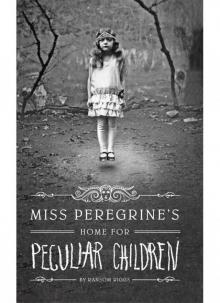 Miss Peregrine's Home for Peculiar Children
Miss Peregrine's Home for Peculiar Children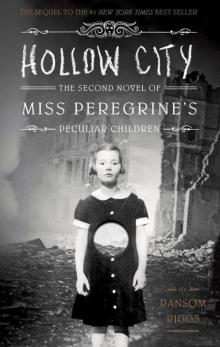 Hollow City
Hollow City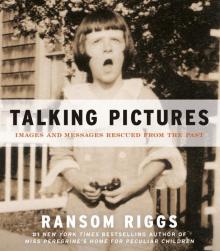 Talking Pictures: Images and Messages Rescued From the Past
Talking Pictures: Images and Messages Rescued From the Past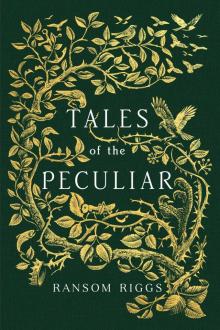 Tales of the Peculiar
Tales of the Peculiar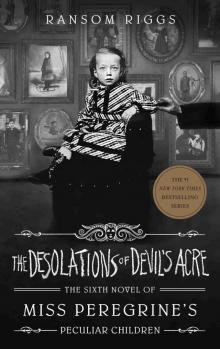 The Desolations of Devil's Acre
The Desolations of Devil's Acre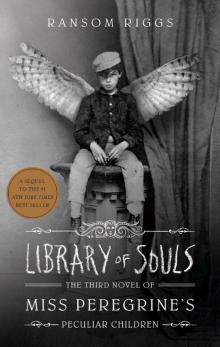 Library of Souls
Library of Souls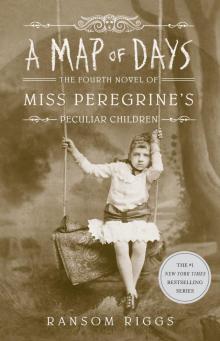 A Map of Days
A Map of Days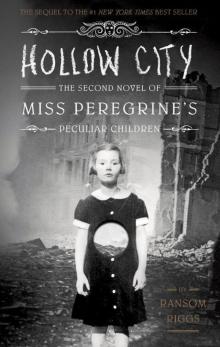 Hollow City: The Second Novel of Miss Peregrine's Peculiar Children
Hollow City: The Second Novel of Miss Peregrine's Peculiar Children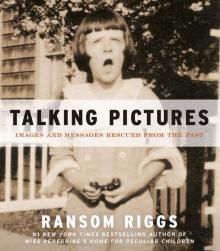 Talking Pictures
Talking Pictures